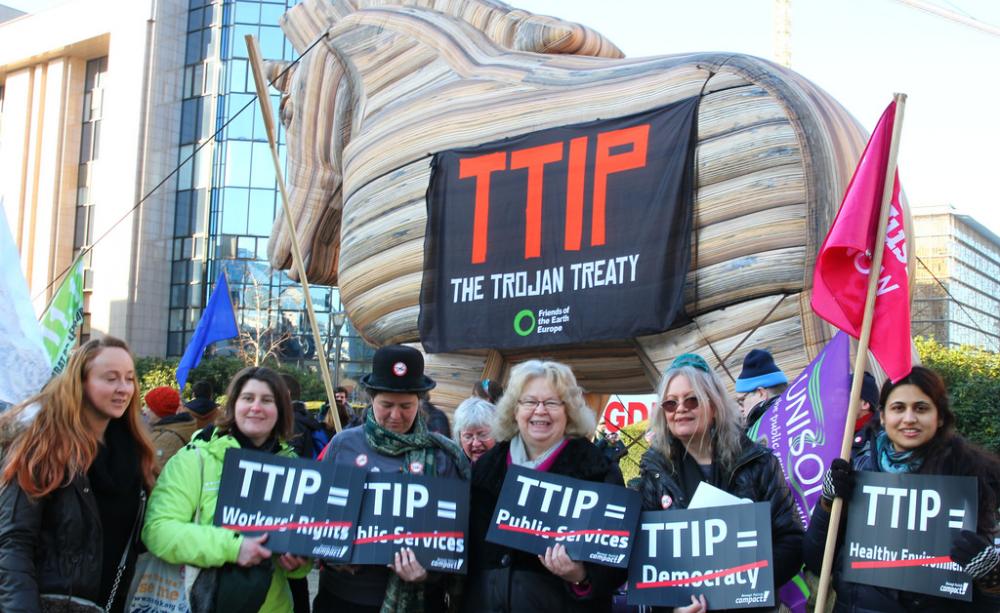Moving forward into a space of democracy, equity and justice demands more scrutiny and criticism of these back-door negotiation spaces.
International trade deals, discussed and negotiated behind closed doors, manage to shape the policy space available for governments to further public interest. For this reason, the TTIP and CETA trade negations commandeered a mass trans-national response.
However the EU-Indonesia trade agreement - otherwise known as the Comprehensive Economic Partnership Agreement (CEPA) - which began its fourth round of negotiations this week, seems to be have gone largely unnoticed by mainstream media. This is concerning, since a recent report concluded that this deal may have negative impacts on democracy, consumer rights and environmental protection.
So what’s wrong with CEPA?
1. Democracy
Trade deals like CEPA are made behind closed doors, denying transparency, public scrutiny or parliamentary debate. Corporate lobbyists often have preferred access, meaning large transnational corporations largely drive the negotiations. This gives them disproportionate influence in shaping the trade agenda, resulting in trade deals that favour corporate rather than public interest.
These deals use trade as an instrument for business growth, rather than to ensure equitable and sustainable development between and within nations. Unlimited market access between parties and protection for foreign investment deepens wealth inequalities and concentrations of markets and capital. In short, the cost of boosting trade is often paid in public welfare.
2. Palm Oil
One of the biggest contentions of the CEPA negotiations surrounds palm oil. Indonesia is the world’s largest producer and exporter of palm oil, followed by Malaysia, with these two countries covering nearly 90 percent of global production.
This huge supply is matched to a huge demand, with palm oil monopolizing ingredient lists in cosmetics, biofuels and processed foods. It is found it over half of consumer goods, from lipstick to ice-cream to pizza dough to soaps.
And to what impact? Rainforests are disappearing at the rate of 169 trees every second, which can be attributed predominantly to palm oil plantations. This deforestation is endangering the existence of several species such as Orangutans, and causing the evacuation of indigenous communities from their native land.
Moving forward into a space of democracy, equity and justice demands more scrutiny and criticism of these back-door negotiation spaces.
It is also increasing greenhouse gas emissions due to a reduction in trees and slash-and-burn clearing techniques, making Indonesia the world’s third largest emitter of greenhouse gases.
Furthermore, the palm oil industry is linked to land-grabbing, human-rights abuses, and degradation of habitats. Regardless, negotiations continue in the hope to expand this $44billion market under the flawed economic logic that ‘if there’s money to be made, there will be trade’.
Certification systems for ‘sustainable’ palm oil are weak, and standards are getting weaker in an attempt to increase the numbers of certified sustainable producers and make palm oil more political palatable.
3. Bad Law
Investor-state dispute settlements (ISDS) has been a serious issue in trade deals, and CEPA is no exception. Trade agreements provide one-sided protection for multinational corporations and foreign investors. This includes international arbitration tribunals (ISDS) that circumvent the national legal system to allow foreign investors to claim against governments.
For example, the Newmont Mining Corporation, which began mining in Indonesia as part as a bilateral investment treaty (BIT), historically argued that the Indonesian government’s plans to implement a ban on unprocessed mineral exports would impinge on the company’s profits and hence violate the investment agreement between Indonesia and the Netherlands. On this basis, they were able to present a claim against the Indonesian government.
Indonesia has had many difficulties in having claims filed against them for pursuing public policy. Because of this, Indonesia announced in 2015 that it would allow all 67 of its BITs to expire.
However, the CEPA deal would re-introduce an investor-state dispute mechanism via the ‘multilateral investment court’. This would lock Indonesia into a system of corporate rights and foreign investor claims, again dissuading the government from tabling new bills/developing new standards in the public interest.
4 Brexit
The CEPA deal is symbolic, as it signals a gateway for exporting this type of trade deal to other countries. Whilst other similar trade deals have historically been hampered, the adoption of CEPA could inspire the revival of other ‘profit over people’ deals such as the TTIP, which is currently dormant.
The fact that CEPA has been resurrected from the ashes of TTIP demonstrates the might and seeming immortality of corporate power. So instead of business as usual, it’s time to rethink the nature of our current trade agreements.
Brexit will demand the renegotiation of many trade deals once the UK leaves the single market. Therefore CEPA deserves extreme scrutiny if it is to be a model future deals are based upon.
It is a possibility that UK trade agreements may forego policies that protect people and planet, to ensure a ‘strong and stable’ economy for a post-Brexit Britain.
It is a possibility that climate and sustainability initiatives will be side-lined to boost trade and economic growth through polluting fossil fuels. Hence, moving forward into a space of democracy, equity and justice demands more scrutiny and criticism of these back-door negotiation spaces.
This Author
Katie Hodgetts works for Friends of the Earth Europe, which is campaigning against the CEPA deal and are envisioning an alternative trade vision.







